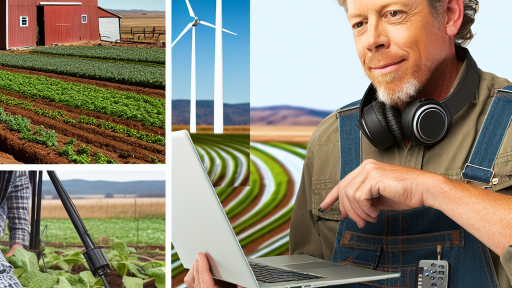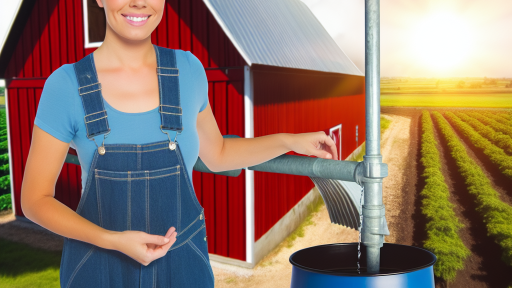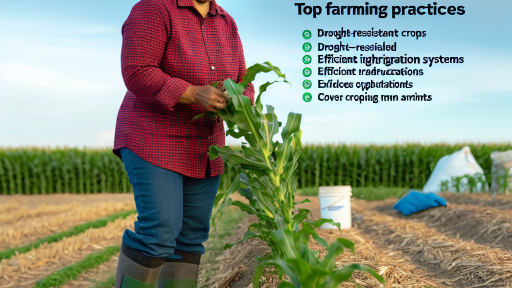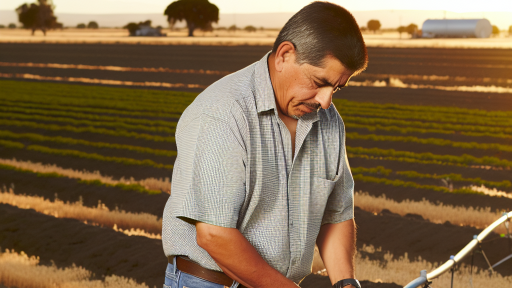Introduction to Integrated Water Management
Definition of Integrated Water Management
Integrated water management (IWM) refers to a holistic approach to managing water resources.
This strategy takes into account the entire water cycle.
IWM integrates land and water management to ensure sustainability.
It aims to balance social, economic, and environmental needs.
Importance of Integrated Water Management
IWM is crucial for sustainable development in agriculture.
It enhances water availability for farming activities.
Farmers can improve their productivity through effective water use.
Furthermore, IWM minimizes the risks of water scarcity.
This approach supports ecological balance and promotes biodiversity.
It also reduces the impacts of climate change on agriculture.
Benefits for Farmers
Farmers can benefit significantly from adopting IWM practices.
-
Enhanced water efficiency leads to cost savings.
-
Improved crop yields result from better resource management.
-
Resilience to drought and other climate-related challenges increases.
Moreover, IWM fosters community engagement in water resource governance.
This collaborative approach strengthens local knowledge and innovation.
The Role of Water Management in Sustainable Agriculture
Importance of Water Resources
Water is a vital resource for agriculture.
It influences crop yields and food security significantly.
Transform Your Agribusiness
Unlock your farm's potential with expert advice tailored to your needs. Get actionable steps that drive real results.
Get StartedMoreover, efficient water management enhances sustainability.
Challenges of Water Scarcity
Many regions face challenges due to water scarcity.
This condition affects both smallholders and large farms.
Farmers must adapt to changing water availability.
Integrated Water Management Strategies
Integrated practices promote the efficient use of water.
These strategies include rainwater harvesting and drip irrigation.
Farmers should also consider crop rotation techniques.
This approach optimizes water usage across different crops.
Benefits of Sustainable Water Management
Utilizing effective water management helps increase yields.
It reduces costs associated with water procurement.
Additionally, it improves soil health and biodiversity.
Farmers achieve resilience against climate variability.
Adoption of Technology in Water Management
Modern agricultural technology enhances water management.
Irrigation systems now use sensors to monitor moisture levels.
These technologies help farmers optimize their water usage.
Data-driven solutions provide insights for better decision-making.
Community Engagement and Education
Community involvement is crucial for sustainable practices.
Farmers can share knowledge about effective water management.
Workshops and training sessions can improve skills significantly.
Collaboration fosters a sense of shared responsibility.
Key Components of Integrated Water Management for Farmers
Understanding Water Resources
Farmers must assess available water resources regularly.
This assessment includes surface water and groundwater sources.
Effective planning starts with identifying local water cycles.
Understanding rainfall patterns helps in resource allocation.
Showcase Your Farming Business
Publish your professional farming services profile on our blog for a one-time fee of $200 and reach a dedicated audience of farmers and agribusiness owners.
Publish Your ProfileSoil Moisture Management
Maintaining optimal soil moisture is crucial for crop health.
Farmers can use tools like soil moisture sensors.
These tools provide real-time data for informed decisions.
Implementing mulching techniques can reduce evaporation.
Irrigation Techniques
Farmers should adopt efficient irrigation systems.
Drip irrigation minimizes water usage and maintains soil health.
Sprinkler systems can cover larger areas effectively.
Regular maintenance ensures these systems operate efficiently.
Water Quality Management
Monitoring water quality is essential for sustainable farming.
Farmers must test water sources for contaminants regularly.
Using proper filtration techniques can improve water quality.
Constant vigilance keeps water sources safe for crops.
Integrated Pest Management
Effective water management aids in pest control strategies.
Over-irrigation can create ideal conditions for pests.
Farmers should balance water use to disrupt pest life cycles.
Preventive measures often yield healthier crops.
Community Engagement
Farmers should collaborate with local water management authorities.
Engagement helps in sharing resources and best practices.
Community forums can address common water issues effectively.
This collaboration builds resilient agricultural systems.
Monitoring and Evaluation
Regular monitoring of water management practices is vital.
Farmers should document water usage and crop yields.
Evaluating these metrics leads to continuous improvement.
Adjustments can optimize practices based on what works best.
Find Out More: Innovative Solutions for Farmers Facing Climate Risks
Techniques for Efficient Irrigation
Drip Irrigation Systems
Drip irrigation delivers water directly to plant roots.
This method minimizes water waste compared to traditional methods.
Farmers can tailor the system to their specific crops.
Additionally, drip irrigation reduces disease risk by keeping foliage dry.
Maintenance of these systems is crucial for optimal performance.
Sprinkler Irrigation Systems
Sprinkler systems are versatile and widely used in agriculture.
They can cover large fields effectively and efficiently.
Farmers can adjust the spray patterns to meet different crop needs.
Moreover, these systems can be automated for better water management.
It’s essential to regularly check for leaks to conserve water.
Surface Irrigation Systems
Surface irrigation includes furrow, basin, and flood irrigation methods.
This system relies on gravity to distribute water across the field.
Farmers benefit from lower installation costs compared to other systems.
However, it often leads to more water loss through evaporation.
Producers should carefully plan the layout for effective water flow.
Showcase Your Farming Business
Publish your professional farming services profile on our blog for a one-time fee of $200 and reach a dedicated audience of farmers and agribusiness owners.
Publish Your ProfileChoosing the Right System
Selecting the right irrigation system depends on various factors.
These factors include crop type, soil characteristics, and local climate.
Farmers must assess their water availability and needs.
Ultimately, a well-chosen system improves yield and conserves resources.
Find Out More: Climate-Smart Practices to Reduce Flood Impact on Farms
Rainwater Harvesting: Benefits and Implementation Strategies
Understanding Rainwater Harvesting
Rainwater harvesting involves collecting and storing rainwater for future use.
This practice helps farmers reduce dependency on conventional water sources.
Moreover, it enhances water availability during dry spells.
Benefits of Rainwater Harvesting
Rainwater harvesting offers numerous benefits for farmers.
First, it provides an alternative source of water for irrigation.
This method helps alleviate water scarcity during critical growth stages.
Second, it reduces soil erosion by controlling runoff.
Consequently, this practice improves soil fertility over time.
Finally, it can lower water bills, enhancing farm profitability.
Implementation Strategies
Farmers can employ various strategies to implement rainwater harvesting.
Collection Systems
First, farmers can install catchment systems on roofs.
Gutters and downspouts direct rainwater into storage tanks.
Next, surface runoff can be collected from fields.
Storage Solutions
Farmers should choose appropriate storage solutions based on needs.
Common options include tanks, barrels, and underground cisterns.
Choosing the right material ensures durability and sustainability.
Maintenance Practices
Regular maintenance is essential for effective rainwater harvesting.
Farmers should clean gutters and check for blockages routinely.
Additionally, inspecting storage systems will prevent contamination.
Community Engagement and Support
Successful implementation often involves community participation.
Farmers can share resources and best practices with neighbors.
Collaboration fosters a supportive environment for innovation.
Implications of Rainwater Harvesting for Sustainable Farming
Adopting rainwater harvesting benefits farmers significantly.
It leads to sustainable farming practices and water resource management.
Ultimately, such initiatives support environmental health and productivity.
You Might Also Like: Soil Management Tips for Effective Carbon Sequestration
Water Quality Management: Monitoring and Mitigation Practices
Importance of Water Quality
Water quality is crucial for sustainable farming practices.
It directly impacts crop yield and livestock health.
Poor water quality can lead to significant economic losses.
Regular Water Quality Monitoring
Farmers should implement regular monitoring of water sources.
This practice helps identify quality issues early.
Utilizing test kits allows for on-site assessments.
Moreover, collaborating with local agricultural extension services can enhance monitoring efforts.
Key Indicators of Water Quality
Farmers must focus on key indicators such as pH, turbidity, and nutrient levels.
- pH indicates acidity or alkalinity levels.
- Turbidity assesses water clarity and particulate matter.
- Nutrient levels, such as nitrogen and phosphorus, affect water usability.
These factors influence plant health and soil quality.
Showcase Your Farming Business
Publish your professional farming services profile on our blog for a one-time fee of $200 and reach a dedicated audience of farmers and agribusiness owners.
Publish Your ProfileMitigation Practices for Contaminated Water
Addressing contaminated water sources is essential for farm sustainability.
Farmers can employ several mitigation strategies.
- Installing sediment traps can reduce sediment entry.
- Employing buffer strips around water bodies minimizes runoff.
- Utilizing constructed wetlands helps filter pollutants.
These measures protect water quality effectively.
Educating Farmers on Best Practices
Ongoing education is vital for effective water quality management.
Farmers should attend workshops and training sessions.
Sharing success stories fosters community learning.
Utilizing Technology in Water Management
Technological advancements can enhance water quality management.
Farmers should explore remote sensing tools for real-time monitoring.
Additionally, using data analytics helps in making informed decisions.
Adopting smart irrigation systems also conserves water.
Collaborative Efforts for Water Management
Collaboration among farmers, scientists, and policymakers is crucial.
Community-based programs can offer shared resources and knowledge.
Establishing local water quality committees fosters accountability and action.
Learn More: Resilient Farming Strategies for Climate Change Impact
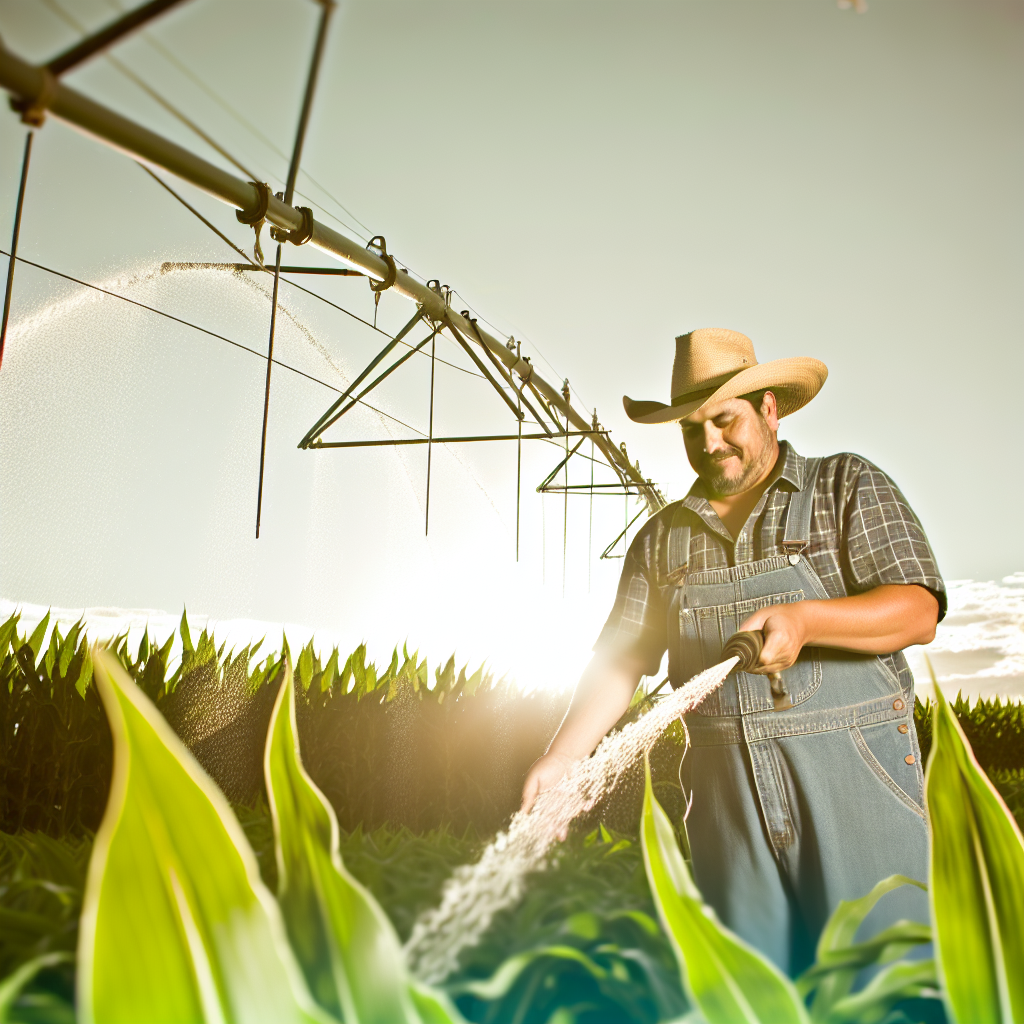
Case Studies: Successful Integrated Water Management Practices from Global Farmers
Innovative Practices in India
Farmers in Rajasthan have adopted rainwater harvesting techniques.
They construct ponds to capture seasonal rainfall.
This method increases groundwater recharge significantly.
As a result, crop yield has improved considerably.
Advancements in Australia
Australian farmers implement advanced irrigation systems.
They utilize precision irrigation technology to reduce water waste.
This approach allows farmers to monitor soil moisture levels closely.
Consequently, water usage efficiency has increased dramatically.
Successful Techniques in Brazil
In Brazil, farmers practice integrated crop-livestock-forestry systems.
This method enhances water retention in the soil.
Additionally, it promotes biodiversity and soil health.
This system has led to increased productivity in various regions.
Community-led Initiatives in Kenya
Kenyan farmers utilize community-based water management strategies.
They form cooperatives to manage water resources collectively.
This model enhances equitable access to water for irrigation.
Furthermore, it strengthens community resilience to climate change.
Technological Integration in the United States
Farmers in California use satellite technology for water management.
They analyze data to optimize irrigation scheduling.
This practice reduces water consumption while maximizing yields.
The integration of technology showcases innovative farming approaches.
Challenges and Solutions in Implementing Integrated Water Management
Identifying Key Challenges
Farmers face various challenges in implementing integrated water management practices.
Water scarcity is a significant concern in many regions.
Poor infrastructure limits efficient water distribution.
Inadequate training often leaves farmers unaware of best practices.
Additionally, farmers may lack access to necessary financial resources.
Technical Limitations
Technical issues can create barriers to effective water management.
Showcase Your Farming Business
Publish your professional farming services profile on our blog for a one-time fee of $200 and reach a dedicated audience of farmers and agribusiness owners.
Publish Your ProfileFor instance, outdated irrigation systems can cause water waste.
Moreover, lack of data makes it difficult to forecast water needs.
Insufficient technology adoption further complicates management efforts.
Policy and Regulatory Barriers
Government policies can either hinder or help water management initiatives.
Inconsistent regulations create uncertainty for farmers.
Complex permit processes often delay implementation of necessary changes.
Ineffective enforcement of existing water management policies can exacerbate issues.
Environmental Considerations
Environmental factors complicate integrated water management efforts.
Climate change leads to unpredictable weather patterns.
Droughts and floods have become more frequent, impacting efficiency.
Soil degradation further reduces the viability of agricultural operations.
Developing Practical Solutions
Implementing cost-effective irrigation techniques provides immediate benefits.
For example, drip irrigation minimizes water waste and increases efficiency.
Utilizing rainwater harvesting systems can enhance water availability.
Moreover, improving soil health naturally boosts water retention capabilities.
Education and Training Initiatives
Investing in education is crucial for overcoming knowledge gaps.
Workshops on water management practices can empower farmers.
Collaboration with agricultural organizations can provide necessary training.
Utilizing local experts to guide practices fosters community engagement.
Policy Advocacy and Support
Advocating for supportive policies can lead to better management practices.
Farmers should engage with local governments to voice their needs.
Incentives for water-efficient technologies can motivate change.
Moreover, streamlining approval processes can facilitate necessary improvements.
Community Collaboration and Sharing Resources
Collaborative efforts can strengthen water management strategies.
Forming local water management groups encourages shared learning.
Pooling resources can help reduce costs for individual farmers.
Additionally, sharing success stories promotes innovative practices.
Future Trends in Water Management for Agriculture: Innovations and Technologies
Smart Irrigation Systems
Smart irrigation systems optimize water use in agriculture.
These systems use sensors to assess soil moisture levels.
Farmers receive real-time data on their irrigation needs.
This technology reduces water waste effectively.
Consequently, crops receive the right amount of water.
Data Analytics in Water Usage
Data analytics transforms water management for farmers.
Agricultural data helps in understanding water patterns.
Farmers can identify areas needing attention.
Additionally, analytics predict future water demands.
Such insights lead to better decision-making.
Rainwater Harvesting Techniques
Rainwater harvesting is gaining popularity among farmers.
This method captures and stores rainwater for later use.
Farmers can significantly reduce their dependence on groundwater.
Showcase Your Farming Business
Publish your professional farming services profile on our blog for a one-time fee of $200 and reach a dedicated audience of farmers and agribusiness owners.
Publish Your ProfileMoreover, this technique supports sustainable practices.
It also enhances water availability during drier seasons.
Soil Moisture Sensors
Soil moisture sensors monitor moisture levels accurately.
These sensors help in scheduling irrigation more efficiently.
Farmers read data directly through mobile applications.
As a result, they can irrigate precisely when needed.
This approach also conserves water resources.
Drip Irrigation Technologies
Drip irrigation delivers water directly to the roots.
This method minimizes evaporation and runoff significantly.
Farmers can see increased efficiency in water usage.
Furthermore, it promotes healthier plant growth.
Overall, drip irrigation leads to higher crop yields.
Climate-Resilient Water Management
Climate change poses challenges for traditional water management.
Adaptation strategies focus on resilience for farmers.
These strategies include diversifying water sources.
Farmers are encouraged to implement adaptive technologies.
Consequently, they enhance their productivity in changing climates.
Collaborative Water Management Practices
Collaborative efforts among farmers improve water management.
Pooling resources can lead to efficient water distribution.
Community-based approaches foster sustainable practices.
Farmers benefit from shared knowledge and experiences.
This collaboration strengthens local agricultural systems.
Additional Resources
Nonpoint Source: Agriculture | US EPA
USDA Science and Research Strategy, 2023-2026: Cultivating …

